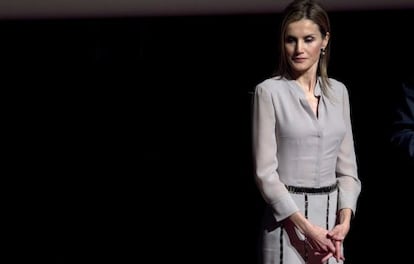Gossip magazine faces investigation over imaginary Letizia interview
‘Diez Minutos’ under fire for publishing chat that “could have taken place” with Spain’s new queen


Spanish gossip magazine Diez Minutos (or, Ten Minutes) faces possible disciplinary action from an ethics and standards commission over the recent publication of an “imaginary interview” with the country’s new queen, Letizia.
“Using reliable sources and checked information, we recreate the conversation that could have taken place with our magazine,” runs a headline on the cover of the publication alongside a photo of Letizia. Inside is a three-page spread in question-and-answer format with a highlighted “quote” stating: “The Prince and I have different characters, but we admire each other.”
The complaint was filed by the Murcia Association of Journalists, which described the story, which was published in the May 28 edition of the magazine when Letizia was still Princess of Asturias, as a “discredit” to journalism that breached “the general principles of professional ethics.”
In response, Diez Minutos said its “figurative interview” with Letizia was “a bold exercise,” adding: “We have imagined what a chat would be like with her, an improbable interview with real replies.”
The Commission for Arbitration, Complaints and Ethics in Journalism, which acts under the auspices of the Spanish Federation of Journalists’ Associations (FAPE), said the Royal Household had not contacted it about the matter, but that it would investigate the complaint. “We need to see if this content, even though it is an imaginary interview, is a distortion,” said FAPE President Manuel Núñez Encabo. “This could have ethical and legal consequences.”
He added that the commission would first establish whether Letizia gave her permission for a fictitious interview, and whether her privacy had been breached by the story. “Freedom of information must be compatible with truthfulness,” he said.
The commission recently looked into a fake television documentary made by journalist Jordi Évole about Spain’s failed military coup of February 23, 1981 that was shown on La Sexta. The film claimed that the coup attempt was organized by the government of the day to bolster the popularity of King Juan Carlos. The commission described the film as “based on lies,” adding that while it did not intend to deceive the public, its aim was to garner a large audience. “The objectives of the program could have been achieved by journalistic procedures in line with ethical principles,” concluded the commission.
Tu suscripción se está usando en otro dispositivo
¿Quieres añadir otro usuario a tu suscripción?
Si continúas leyendo en este dispositivo, no se podrá leer en el otro.
FlechaTu suscripción se está usando en otro dispositivo y solo puedes acceder a EL PAÍS desde un dispositivo a la vez.
Si quieres compartir tu cuenta, cambia tu suscripción a la modalidad Premium, así podrás añadir otro usuario. Cada uno accederá con su propia cuenta de email, lo que os permitirá personalizar vuestra experiencia en EL PAÍS.
¿Tienes una suscripción de empresa? Accede aquí para contratar más cuentas.
En el caso de no saber quién está usando tu cuenta, te recomendamos cambiar tu contraseña aquí.
Si decides continuar compartiendo tu cuenta, este mensaje se mostrará en tu dispositivo y en el de la otra persona que está usando tu cuenta de forma indefinida, afectando a tu experiencia de lectura. Puedes consultar aquí los términos y condiciones de la suscripción digital.








































